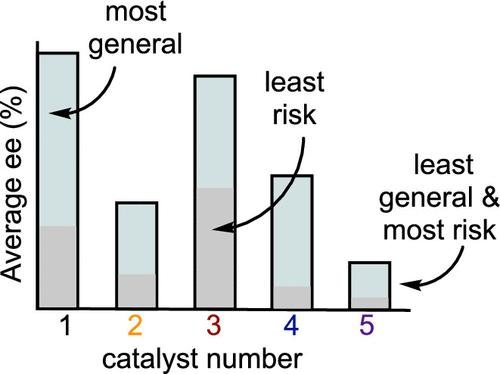相对通用性与风险:广义催化剂成功的量化措施
IF 11.3
1区 化学
Q1 CHEMISTRY, PHYSICAL
引用次数: 0
摘要
手性催化剂的性能通常根据产率和选择性等经验反应结果进行评估,传统分析仅限于单一模型系统。反应空间的扩展允许对催化剂的通用性进行评估,这为衡量催化剂的有效性提供了另一个有用的指标。催化剂通用性算法将为催化剂结构分配定量的通用性值,但这种广泛的评估是在假设所评估的反应大致相同的前提下进行的,忽略了与特定反应类别相关的任何固有挑战。为了解决这一局限性,我们引入了两个指标:相对通用性和风险。这两个指标旨在纠正反应难度的变化,并根据每个反应的具体要求对催化剂性能进行更细致的评估。我们通过大量具有挑战性的实例表明,这些指标可以让研究人员区分真正表现出卓越性能的催化剂和那些由于应用于要求较低的反应而显得有利的催化剂。这代表了量化催化剂成功率方面的重大进步,在回顾性分析和早期洞察新兴催化剂类别中的应用得到了证实。本文章由计算机程序翻译,如有差异,请以英文原文为准。

Relative Generality and Risk: Quantitative Measures for Broad Catalyst Success
The performance of chiral catalysts is typically evaluated against empirical reaction outputs like yield and selectivity with traditional analyses limited to a single model system. Expansion of the reaction space permits catalysts to be assessed for generality, and this provides another useful metric for measuring the effectiveness of a catalyst. The catalyst generality algorithm will assign quantitative generality values to catalyst structures, but such broad assessments are applied with the assumption that the reactions under evaluation are more or less the same by disregarding any inherent challenges associated with a particular reaction class. To address this limitation, we introduce two metrics: relative generality and risk. These are designed to correct for variations in reaction difficulty and enable a more nuanced evaluation of the catalyst performance relative to the specific demands of each reaction. We show in a number of challenging examples that these metrics allow researchers to distinguish between catalysts genuinely exhibiting superior performance and those appearing favorable due to application toward less demanding reactions. This represents a significant advancement in quantifying catalyst success with demonstrated applications in retrospective analyses and early insights into emerging catalyst classes.
求助全文
通过发布文献求助,成功后即可免费获取论文全文。
去求助
来源期刊

ACS Catalysis
CHEMISTRY, PHYSICAL-
CiteScore
20.80
自引率
6.20%
发文量
1253
审稿时长
1.5 months
期刊介绍:
ACS Catalysis is an esteemed journal that publishes original research in the fields of heterogeneous catalysis, molecular catalysis, and biocatalysis. It offers broad coverage across diverse areas such as life sciences, organometallics and synthesis, photochemistry and electrochemistry, drug discovery and synthesis, materials science, environmental protection, polymer discovery and synthesis, and energy and fuels.
The scope of the journal is to showcase innovative work in various aspects of catalysis. This includes new reactions and novel synthetic approaches utilizing known catalysts, the discovery or modification of new catalysts, elucidation of catalytic mechanisms through cutting-edge investigations, practical enhancements of existing processes, as well as conceptual advances in the field. Contributions to ACS Catalysis can encompass both experimental and theoretical research focused on catalytic molecules, macromolecules, and materials that exhibit catalytic turnover.
 求助内容:
求助内容: 应助结果提醒方式:
应助结果提醒方式:


